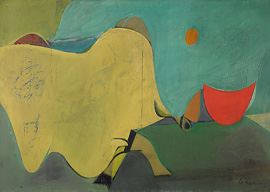
January 20, 2012

Untitled (The Cow Jumps Over the Moon), 1937–38 by Willem de Kooning
The de Kooning show just closed at MoMA, and I just finished reading The Quest: Energy, Security, and the Remaking of the Modern World by Pulitzer Prize-winning author Daniel Yergin.
We are as obsessed with oil as de Kooning was with oil paints. Trying to follow US energy policy is as pendulous as following de Kooning’s swings from abstract to representational and as grotesque as some of his figures.
From Pennsylvania to the Strait of Hormuz, The Quest has great locations, is packed with breathless story lines, and we meet lots of fascinating people: Edison, Ford, Einstein, and Haagen-Smit, the “father of smog.”
But everything is a battle for Yergin. “The world abruptly changed….The seemingly immutable structure of global confrontation had suddenly buckled,” he writes, referring first to the 1973 oil embargo, then to the opening of new countries to foreign investment in the 1990s.
Good thing it isn’t the Earth itself that’s so wildly oscillating, only “the Modern World,” i.e., the energy industry. Because that’s what the book is about—an industry trying to find markets for its products and succeeding beyond its wildest dreams.
De Kooning said flesh was the reason oil paints were invented, but he used them to power everything: cloth, muscle, teacups, tables, faces, and even space. With oil paint, you can go through things without consuming them and touch things without polluting them.
As for petroleum, it was first used for illumination. Just when it was about to lose that market to electricity the automobile came along, and then an even bigger motor to fuel: The Global Economy.
In 1906 grain prices were low and farmers unhappy, so Teddy Roosevelt lifted the alcohol tax and ethanol developed as a fuel. Later it was banned along with other alcohols during Prohibition. In 1971 Nixon established price controls; in 1981 Reagan repealed them. In 1979 Carter had solar panels installed on the White House roof; in 1986 they were dismantled—along with the R&D programs they symbolized.
“There are many parts to the quest, but fundamental to it, and underpinning everything else, is the search for knowledge, which advances technology and promotes innovation,” writes Yergin, making Texas oil men, Kazak dictators, and Omani sheiks the equivalent of mystics or Enlightenment thinkers.
In his painting Excavation, de Kooning draws on the rich deposit of art history and through applied thought and studied technique gives each line, black as pitch or bright as the sun, its own motive force.